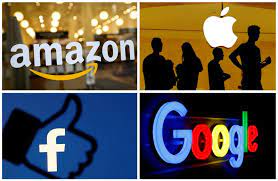New digital regulations introduced by the European Union on Wednesday target businesses like Apple, Amazon, Microsoft, Alphabet, the parent company of Google, Facebook’s owner Meta, and ByteDance, the company behind TikTok
Under the Digital Markets Act of the 27-nation bloc, the six businesses were categorized as online “gatekeepers” who must endure the strictest levels of inspection. The act essentially consists of a list of dos and don’ts that attempts to stop internet giants from snatching over new digital marketplaces under penalty of hefty fines or even the risk of a corporate split. It comes weeks after the Digital Services Act, a related set of regulations aimed at ensuring the safety of internet users, started taking effect.It is part of a comprehensive overhaul of the EU’s digital rulebook that is starting to take effect this year. Before the announcement, European Commissioner Thierry Breton, who oversees the bloc’s digital policy, said it was “time to turn the tables and ensure that no online platform operates as if it were ‘too large to care. Digital platforms can be categorized as gatekeepers, according to the Executive Commission of the EU, if they serve as important conduits between companies and customers by offering “core platform services.”
These services include the Google Chrome web browser, the Windows operating system from Microsoft, chat programs like WhatsApp from Meta, social networks like TikTok, and others that act as middlemen like the Amazon Marketplace and Apple App Store. It will be necessary for messaging services to cooperate with one another. Users of Telegram or Signal could thus send SMS or video files to those of WhatsApp.
Platforms are not allowed to rank their own goods or services higher in search results than their competitors. Therefore, Amazon is prohibited from making its own-brand products simpler to find than those from independent vendors. Online providers must have specific permission before combining a user’s personal information to create a profile for targeted advertising.
Fines of up to 10% of a business’s annual global revenue, and up to 20% for repeat offenders, or even the dissolution of the corporation, could be imposed for violations.


















